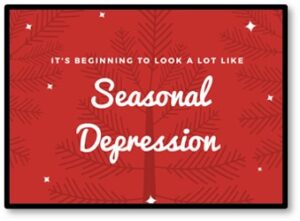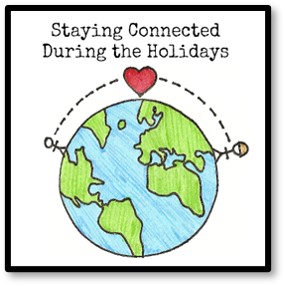Monday Author: Susanne Skinner
 December is not everyone’s favorite time of the year. For many, it brings added stress, loneliness and sadness. The commercialization of the holiday season creates the false expectation that it’s a month of unending joy and celebration.
December is not everyone’s favorite time of the year. For many, it brings added stress, loneliness and sadness. The commercialization of the holiday season creates the false expectation that it’s a month of unending joy and celebration.
In fact, it is the month when most people experience bouts of depression, and the suicide rate is higher in December than any other month of the year. The holidays don’t bring joy for everyone, especially those suffering emotional traumas like illness, isolation, loss of loved ones, or financial difficulty. In other words, all of us in 2021.
When everyone around you seems filled with the holiday spirit it’s hard to experience happiness if you feel stress and exhaustion. The months of November and December ring in with holiday celebrations and the holiday blues, also known as seasonal depression.
The Holiday Blues
Even if you love the holidays, you can still feel the heighted pressure that comes with them. There is no shame here because you are in the company of others—in fact, many others—who feel the same.
As the days get shorter and colder the holiday blues sneak up and catch you off guard. Triggers include ads depicting perfect families or the pressures of holiday shopping. They jump-start feelings of separation and loneliness that often lead to disconnecting from friends and family.
Unfortunately, people experiencing seasonal depression and ignore it are more likely to remain depressed when the holidays are over.
In all honesty, there is no singular reason for the holiday blues. It is not a recognized psychiatric condition, but it is gaining awareness as we develop a better understanding of what it is and what causes it.
Most of us know someone who suffers from this phenomenon and many of us can raise a hand and admit to it ourselves. If we are aware of our sadness, we may decide not to impose it on others, and it’s also possible we are unaware of what is wrong.
Stay Connected
Depression interferes with every aspect of daily living. It affects relationships, job performance, communication and even parenting.
 Emotional support during the holidays is invaluable. If you find yourself alone, don’t stay that way. Reach out to friends and connect by phone and email. If it’s a particularly difficult time, consider an appointment with a professional for some assistance.
Emotional support during the holidays is invaluable. If you find yourself alone, don’t stay that way. Reach out to friends and connect by phone and email. If it’s a particularly difficult time, consider an appointment with a professional for some assistance.
Social isolation is a major risk factor for depression; when you are sad you want to be alone. If circumstances or distance prevent in-person gatherings, consider some long-distance options. Zoom, Face Time and Skype allow us to check in on one another and offer visual reassurance. Face-to-face conversations lift us up and remind us that people care.
Unrealistic Expectations
Let’s face it, this stuff is difficult to navigate. The ability to say, ‘it is what it is” is not the right answer. Accepting “what is” does not constitute agreement. It means that you acknowledge “what is” while trying to understand and work through it. These emotions are not permanent.
As children we embrace the mystery of Santa Claus, the abundance of gifts, parties and the building excitement of Christmas Day. These expectations carry into our adult lives and we commit to the belief that each Christmas will be better than the last. We know it’s not reality, yet we continue to expect it.
According to the National Alliance on Mental Illness, we disappointment ourselves when we are unable live up to the fantasy we create. Acknowledging that we’re not living up to holiday expectations makes us feel like we’re letting everyone down, including ourselves. You are not alone if you feel this way.
By understanding what makes us sad we’re able recognize and control the triggers before they hijack our happiness.
If the holiday season passes and you’re still feeling depressed or anxious, talk to a mental health professional to determine if it is more than seasonal. Depression that remains unchecked risks serious mental and physical side effects.
Holiday Stress and Anxiety
Depression occurs at any time of the year, but seasonal stress and anxiety cause even the mellowest of people to feel unfulfilled during the holidays. Family traditions and memories are a big part of seasonal celebrations. It’s easy to slide back to happier times, but that often comes at the expense of the present moment.
Grief intensifies depression during the holidays, especially for someone suffering a recent loss. John Irving, in his book A Prayer for Owen Meany, writes that Christmas is also our time to be aware of what we lack—of who is not home.
For a hot minute I felt that pain. The death of my father, undertaking a major relocation for my disabled sister, and a positive Covid diagnosis two days before Christmas made it difficult to feel any joy. My emotions centered on grief and loss.
The easiest way to manage this is by acknowledging it with remembrances that celebrate your loved ones and allowing others to help rekindle your light.
The Holiday Challenge
 Be kind to yourself and to others. It’s ok to say no—you don’t need to accept every invitation or holiday project. Limit your social engagements as well as gift buying and giving. Conserve your mental, physical and emotional energy and practice daily gratitude.
Be kind to yourself and to others. It’s ok to say no—you don’t need to accept every invitation or holiday project. Limit your social engagements as well as gift buying and giving. Conserve your mental, physical and emotional energy and practice daily gratitude.
Be grateful for pockets of joy rather than waiting for the million-dollar payout. Begin your mornings with a positive affirmation that nurtures you throughout the day.
Don’t allow the negative to outweigh the positive. By expressing gratitude, we center ourselves in our blessings, and there is always a reason to be thankful.
Dr. Stacey Maxell says, “Let your light shine so brightly that others can see their way out of the darkness.” Shine your light throughout this holiday season! Help someone rekindle the light inside of them by sharing yours. The light we see in others is a reflection of the light we shine.
